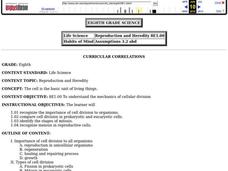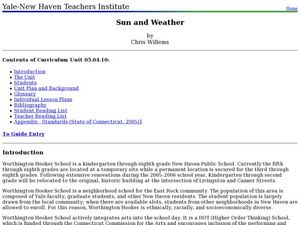Curated OER
Variation and Heredity
Junior geneticists tally eye color and height in their lab groups. They examine certain traits in soybean and corn seedlings. For each activity, they gather data and learn about continuous and discontinuous genetic variation. In another...
Curated OER
Where'd You Get Those Genes?
Really a unit, this resource exposes middle schoolers to genetics at their level. They read interviews and biographies, trace a family tree, play games that simulate inheritance concepts, and more! Teacher's procedures, student...
Curated OER
The Human Genotype
Six different chromosome activites introduce biology aces to heredity, chromosomal abnormalities, sex-linked traits, and the human genome. The hands-on activites are fairly simple for the teacher to prepare and will prove to be both...
Curated OER
Heredity Mix 'n Match
Students randomly select jelly beans that represent genes for several human traits such as tongue-rolling ability and eye color. Then, working in pairs (preferably of mixed gender), students randomly choose new pairs of jelly beans from...
Curated OER
Mendelian and Non-Mendelian Heredity
Tenth graders discuss their physical features, and why they look the way they do. They listen as the teacher discusses DNA, alleles, and dominant or recessive genes. Students perform an experiment with different colored markers...
North Carolina State University
Exploring Genetics Across the Middle School Science and Math Curricula
Where is a geneticist's favorite place to swim? A gene pool. Young geneticists complete hands-on activities, experiments, and real-world problem solving throughout the unit. With extra focus on dominant and recessive genes, Punnett...
Curated OER
The Cell
Students study the basic processes by which cells divide and transfer their genetic information. They recognize and distinguish possible inherited traits and through the discovery method of the facts and principles of inheritance....
Curated OER
Genetics Survey Project
Complete a survey on genetics and the mechanics of heredity.and review the list of human traits observed. Practice interviews are conducted with each other so that noone feels unconformable if they don't have one trait or another. One...
Curated OER
Sociobiology: Heredity Factors
Learners examine DNA replication and how proteins are synthesized from DNA codes and continue to explore the effects of genetics in additional lessons. Among the topics covered are: protein synthesis, cell chemistry, environmental...
Curated OER
TE Lesson: What's Dominant?
Students study the number of chromosomes in the body cells, sperm cells, and egg cells of humans. They define allele, and examine the difference between dominant and recessive alleles. They complete an activity with jelly beans that...
Curated OER
Basic Introduction to Foundation of Life: Genes, Genetics and Genetic Diseases
Learners are introduced to genetics along with genetic diseases and heredity. In groups, they complete a Punnett Square to determine the dominant and recessive genes. After viewing diagrams, they identify the characteristics of DNA and...
Curated OER
Strawberry Smoothies
Biologists extract the DNA from a strawberry. After completing the procedure, learners write answers to a few questions on the lab sheet provided. This is ideal lab practice during a DNA unit in your general biology course.
Curated OER
Reproduction and Heredity
Eighth graders study the importance of cell division, compare cell division in prokaryotic and eucaryotic cells, identify the stages of mitosis and recognize meiosis in reproductive cells.
Curated OER
Here's Looking at You
Students assess some common inherited traits which are easily observable and note their phenotype for the trait. Students compare their phenotypes to those of their parents and attempt to describe the pattern and manor of inheritance.
Curated OER
Construction of a Hemoglobin Gene
Young scholars see how eight pairs of triplets are equivalent to part of a gene and control a part of heredity. They comprehend how blood corpuscles manufacture normal hemoglobin. Students already comprehend that genes control the...
Curated OER
Traits
Sixth graders consider heredity. In this science lesson plan, 6th graders gain an understanding of certain physical traits are inherited from their parents through the genes.
Curated OER
Science Writing for the Masses: a Primer
Learners demonstrate a basic understanding of the molecular basis of heredity. They discuss the chemical and structural properties of DNA and explain how genetic information is encoded in genes, replicated, transcribed and translated...
Curated OER
Sun and Weather
How is the Earth's weather created? Middle schoolers will explain how the Sun's energy is transformed into different forms. They will perform mathematical calculations of volume, mass, and temperature. They they will explain the...
Curated OER
Human Embryology
Ninth graders are introduced to the concept of human embryology. Individually, they complete an exercise in which they determine which trait they got from which family member. In groups, they identify and label the reproductive organs...
Curated OER
Ecosystems and Remote Sensing
Students obtain remote sensing data to compare and contrast global biomass data with global temperature data.
Curated OER
Fruit Fly Ranch Activity
Seventh graders describe how the traits of an organism are passed from generation to generation. They distinguish between asexual and sexul reproduction. Students identify traits through genes and those resulting from interactions with...
Curated OER
Cell Works
Young scholars observe slides of cork cells and discuss the use of microscopes. They view a power point presentation on "Looking Inside Cells" and take notes aligned with the PPT presentation. They collaborate with a partner to create an...
Curated OER
Cell Structure and DNA
Sixth graders identify, locate and describe the function of the parts of a cell. In groups, they state the five stages of mitosis and put them in the correct order. They are introduced to the structure of DNA and mRNA and how they...
Curated OER
Karyotype Puzzle
Students identify chromosome pairs based upon band patterns and location of centromere. They order chromosome pairs based upon size. Students differentiate normal karyotypes from abnormal karyotypes. They correctly record karyotype...

























